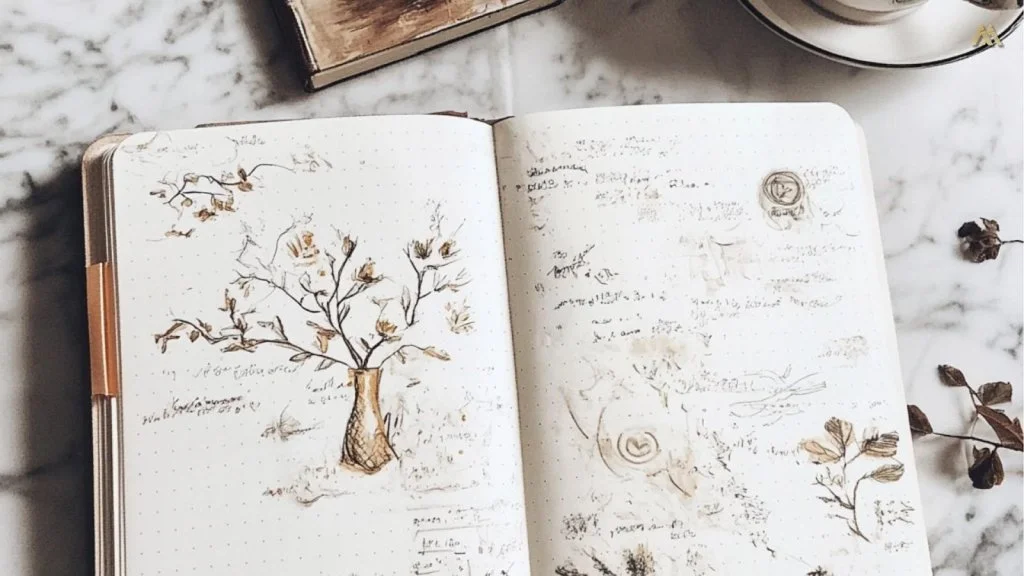Journaling as commonly seen is not only limited to just writing down thoughts but actually it’s a powerful tool for personal reflection and mental health, especially during the hard times. By writing down your thoughts, you can gain clarity on your emotions and create a safe space for yourself where you can gather yourself . Whether you are writing down your daily tasks or your deeper concerns, journaling offers a structured way to express feelings that might feel burdening or unclear.
It is worth valuing how journalism can help you in hard times. It can act as a release for your stored emotions, offering a sense of relief and helping to manage stress. It is seen that regularly writing helps you face your challenges with a clearer and sharper mindset. This simple practice can make the difficulties feel more manageable, providing a stable effect that builds resilience and emotional stability.
What is Journaling?
Journaling is basically the practice of recording your thoughts, feelings, and experiences either on paper or in a digital format. It’s a personal activity that enables you to reflect on your day, process your emotions, and make sense of what’s going on in your life. There’s no right or wrong way to journal, you can write daily, or you can write down your thoughts whenever you feel the need. This simple act of self-expression helps you to connect with yourself, providing an exit for your emotions and a way to gain understanding into your own mind.
How to journal?
It is important to understand how to journal because journaling can help you in hard times and understand yourself. Getting started with journaling is simple and doesn’t require any special skills or tools. You can begin by finding a comfortable space and choosing a method that feels more natural to you. It can be a notebook, a journal app, or even a voice recording.
To start, specify a few minutes each day or week, and write whatever spontaneously comes to your mind. You need not to be grammatically and structurally correct as journaling is for your eyes only and not others to see. You will find it helpful to start with prompts, such as “What am I feeling right now?” or “What challenges did I face today?” Over time, journaling can become a comforting habit, helping you to process thoughts and emotions at your own pace. To journal you should consider:
Try To Write Every Day

Try to make journaling a daily habit of yours, even if it’s just for a few minutes. Writing each day will help you build consistency, making it easier to track your emotions and see patterns over time. By setting aside this small daily practice, journaling can become a natural part of your routine, providing a regular space for your growth.
Make It Easy
Keep your journaling routine simple and basic. Use a notebook or app that’s always within your reach, so you can instantly write down your thoughts whenever you are in the mood. The easier it is to start writing, the more likely you’ll be to make journaling a regular part of your day.
Write Or Draw Whatever Feels Right
While journaling you don’t need to follow any specific rules, you can write or draw whatever helps you express yourself. You might write a few sentences, you can sketch, or even create a mind map of your thoughts. Letting yourself freely express emotions, in any form, makes journaling a more personal and a fulfilling experience.
Use Your Journal As You See Fit

Your journal is your personal space, so use it in whatever way it feels best for you. It can be a place to set goals, express your frustrations, or even track your achievements. Make it suit your needs, and make changes as you want because there’s no “wrong” way to journal.
Journaling can help you stay strong during challenges. Check out our article on Effective Tips to Stay Positive and Resilient During Tough Times for more advice.
Can your diary keep you healthy?
Yes, a number of studies and researches back this up that keeping a diary can actually support your mental and physical health in many ways. By regularly writing down your thoughts and feelings, you create an outlet for your stress, which can reduce anxiety and help you process difficult emotions. This kind of activity has been shown to boost mood, improve sleep, and even strengthen the immune system.
Journaling can also help you identify the patterns in your behavior that triggers stress, making it easier to manage mental health challenges. In a lot of ways, your diary becomes a tool for you to take care of yourself, helping you stay balanced, especially in the hard times.
Why does journaling work?
Journaling works efficiently because it gives you a structured way to feel and release your emotions, which can make difficult feelings feel more manageable. When you write things down, you force yourself to slow down and process your thoughts, that leads to greater clarity on your thoughts. This practice engages both the emotional and logical parts of the brain, helping you simplify the complex thoughts and see situations from a newer perspective.
By getting your worries and stresses out on paper, journaling can help reduce their intensity and help you approach challenges more calmly. It’s a simple, effective way to build and strengthen your emotional well-being.
How to start a journaling practice Using These Simple And Efficient Tips
If you are wondering how to get going with journaling these simple and efficient tips will help you get started and understand how journaling can help you in hard times:
Take A Micro-Step
Start by taking small steps, by dedicating just a few minutes each day or writing even a single sentence. This “micro-step” approach will make journaling feel easy and achievable to you, helping you build a routine without pressuring yourself. Over time, these small efforts can lead to a rewarding and consistent journaling habit.
Try Free Writing
Writing freely without worrying about any sort of grammar or sentence structure is really helpful in helping you get started with journaling. This method allows you to express whatever comes to mind, helping clear mental blocks.
Let It All Out

In journaling you should not hold back your thoughts, you need to let your emotions flow freely onto the page. Journaling is a safe space where you can express your frustration, sadness, or joy without judgment. By letting it all out, you help yourself to ease mental tension and provide emotional relief.
Connect The Dots
You should look for patterns or connections in your writing to gain a deeper understanding of your thoughts and emotions. As you journal regularly, you may start noticing repeating patterns that can help you understand yourself better. Connecting the dots in your entries can reveal important lessons and guide your personal growth.
Avoid Re-Reading Painful Entries
As journaling helps to process emotions, you should avoid re-reading painful entries too soon. Seeing the difficult thoughts again can bring back the negative feelings. It’s important to give yourself space and time before reflecting on painful moments so that you can heal properly.
Why is journaling so helpful and so efficient in supporting us in so many ways?

Journaling is incredibly helpful because it provides a safe and private space to express our thoughts and emotions. It involves a complex process of handwriting and writing down our thoughts. As many areas of our brain are stimulated by this activity, it helps us with our memory. Writing with our hands helps us to be mindful and be present in the moment.
This practice encourages self-reflection, helping us gain clarity and perspective on challenging situations. Additionally, journaling can boost creativity and enhance problem-solving skills. It’s a simple yet powerful tool that supports emotional health and provides a sense of control during difficult times.
Why is Journaling Good For You And How Does It Help You?
Journaling can be very beneficial for you and it can help you in hard times. Journaling can be good for you in many ways:
Achieve Goals
Journaling helps you achieve your goals by providing a space where you can let your emotions out and focus on the goal. Writing down your goals makes them feel more achievable. As you see your writing again, you can adjust plans accordingly and celebrate small wins, maintaining your motivation.
Track Progress And Growth
Journaling allows you to track your progress and growth over time. By regularly noting your challenges and achievements, you can look back and see how far you’ve come. This sense of progress boosts self-esteem and provides motivation to keep moving forward.
Gain Self-Confidence
Journaling is very effective in building self-confidence by helping you reflect on your strengths and weaknesses. Writing about positive experiences and accomplishments reminds you of your capabilities. As you track your growth, you gain a clearer sense of your worth and abilities.
Improve Writing And Communication Skills
Consistent journaling helps improve writing and communication skills by encouraging you to express your thoughts clearly. The more you write, the more you refine your ability to organize ideas and convey them effectively. This practice builds vocabulary, enhances grammar, and strengthens your overall writing style.
Journaling Relieves Stress and Anxiety

Journaling is very powerful when it comes to relieving stress and anxiety. Writing about your thoughts and worries helps you process them, reducing their intensity. It allows you to gain perspective, find solutions, and release the tension. Regular journaling can help calm your mind, creating a sense of control and promoting emotional well-being.
Find Inspiration
Journaling can boost your inspiration by giving you the freedom to explore your ideas and without being judged. Writing helps understand new perspectives and insights, leading to unexpected moments of inspiration. Whether through free writing or reflecting on past experiences, journaling can provide fresh ideas and motivate you to pursue your passions.
Journaling Develops Emotional Intelligence
Journaling helps develop emotional intelligence as you become more self-aware. As you write about your feelings and reactions, you gain a better understanding of your emotional patterns. This self-reflection builds empathy, allowing you to connect with others more deeply. Regular journaling helps you manage emotions more effectively, improving both personal growth and relationships.
Journaling Enhances Creativity
You get more creative when you write down your thoughts, so you always try a new way to do the same task. Writing without restrictions allows your mind to be free, often leading to fresh ideas and unique solutions. The regular practice of journaling encourages creative thinking and helps break through the mental blocks. By writing, you develop new ways of thinking, boosting your imagination and problem-solving abilities.
Journaling prompts to get you started

Prompts are a great way to start your journaling as they help you get into the flow of writing. You can try prompts like “What am I grateful for today?” or “What’s been on my mind lately?” to begin exploring your thoughts. Other prompts might focus on emotions. You can also use prompts that encourage creativity. These simple prompts provide a starting point, making journaling feel less hectic while helping you dive into your thoughts and emotions. You can use these journaling prompts to get started:
- What are three things you’re grateful for today?
- How do you feel at this very moment, and why?
- Write about a recent challenge and what you learned from it.
- Describe a happy memory and what made it special.
- What are your goals for the week or month ahead?
- What’s one thing you can do today to take care of yourself?
- Write about a time when you felt proud of yourself.
- What are the things that are weighing on your mind right now?
- If you could change one thing about your day, what would it be?
- Describe a place that makes you feel at peace.
The Psychology Behind Journaling
The psychology behind journaling is based in its ability to help process emotions and reduce stress while promoting self-awareness. When we write down our thoughts and feelings, we accept them, which makes them easier to understand and manage and it has therapeutic outcomes. This activity helps to organize the emotions providing emotional relief.
Journaling also activates the brain’s problem solving and reflective areas, which helps in coping with stress, anxiety, and difficult situations. The repetitive act of writing can also help avoid the negative thoughts, promoting a more positive mindset. Journaling strengthens emotional power by encouraging mindfulness and giving you a tool to process life’s challenges in a healthy and constructive way.
Journaling Benefits and How to Start Right Now
Journaling offers a wide range of benefits and it can help you in hard times. Journaling benefits are not only limited to emotional well being, you also feel the physical benefits as well:
Journaling Helps To Reduce Stress
If you feel stressed out, journaling can be helpful for you as it allows you to release your stored emotions and worries onto paper. By putting your thoughts in writing, you gain clarity, which can make stressful situations easy to face. This act also can create a sense of relief, helping you control your feelings in a healthy way.
Journaling May Boost Health And Well-Being

Journaling can also boost physical health and well-being by supporting mental and emotional health. Writing about your feelings results in lower stress and anxiety, which in turn improves overall physical health. Journaling has been linked to better sleep, reduced inflammation, and a stronger immune system. This simple practice enhances self-awareness and promotes an emotional balance in life.
Journaling Encourages Space From Negative Thoughts
You can release your negative thoughts onto the sheet of paper through journaling. Writing helps create distance between yourself and your overwhelming emotions, helping to build a clearer perspective. This process of releasing negative feelings makes them easier to manage and cope with. Journaling can help reduce the intensity of negative thoughts and make you more positive.
Journaling Can Help You Figure Out Your Next Step
If you are stuck and can’t figure out what to do next, journaling can help you figure out your next step. Journaling helps you understand your goals and visions more clearly. Writing about your current situation and challenges can provide clarity and help you see possible solutions. As you explore different options on paper, you gain insight into what feels right for you. This helps you in your decision making process and makes it easier for you to decide what to do next.
Journaling Deepens Self-Discovery
In journaling you explore your inner thoughts that deepens your self-discovery. Regular writing helps you understand your motivations, fears, and desires more clearly. As you reflect on past experiences and present feelings, you uncover new views about who you are. This ongoing process allows you to build a stronger connection with yourself and make more informed choices in life.
Journaling is a great way to practice self-care and kindness. Read our article on How to Be Kind to Yourself: Simple Tips for Self-Care and Love to learn more.
Explore the many different types of journaling
Journaling can be simple yet diverse, so you don’t need to worry as you can explore a wide variety within journaling that you can adopt and get started.
Dream Journal

You can explore your subconscious mind through a dream journal . By writing down your dreams as soon as you wake up, you can capture the details before they fade away. By this practice you can gain insights into your emotions, thoughts, and inner desires. A dream journal may reveal patterns that guide your personal growth and self-awareness.
Food Journal
A food journal is a great way to track your eating habits and develop a healthier relationship with food. By writing down what you eat, how much, and when, you can get a familiarity with your food patterns and behaviors and then adjust accordingly if needed. This type of journaling helps you become more mindful of your food choices and can support goals like weight management or improving nutrition.
Fitness Journal
A fitness journal is also an excellent way of tracking your exercise routines, progress, and goals. When you record your workouts, intensity, and how you feel, you can monitor improvements and stay motivated. It also helps identify areas where you might need to adjust or push yourself harder. A fitness journal can be your right step towards adopting a healthy and fitter lifestyle.
Sketch Journal

If you enjoy sketching then you can surely start a sketch journal that basically mixes sketching and writing, allowing you to express your thoughts and emotions visually. It’s a creative way to express ideas, feelings, or moments in time through sketches, doodles, or illustrations. This type of journaling offers an alternative to traditional writing. A sketch journal becomes a personal visual diary, with which you can connect and relive the artistic thoughts of you.
Gratitude Journal
A gratitude journal usually focuses on building a positive mindset by encouraging you to write down things you’re thankful for each day. This practice helps shift your focus from what’s lacking to what’s abundant in your life. This type of journaling makes you content with what you possess. It’s a simple yet powerful way to enhance your perspective and be more grateful in life.
The do’s and don’ts of a diary

When keeping a diary, there are some helpful do’s and don’ts that you should keep in mind. Do make your diary a safe, judgment-free space of your thoughts and emotions. It’s important to write regularly, even if it’s just a few sentences, to create a habit that supports your well-being. You should also be honest with yourself and write the negatives as well so that you can know who you really are.
Also, don’t worry about grammar or structure, as this is your diary, not for evaluation. Avoid comparing your writing to others, as everyone is unique. Lastly, don’t feel pressured to write every day if it feels hectic; journaling should be a positive and stress-free experience. Keep your diary in a safe place and within your reach.
Conclusion
Journaling is a powerful and versatile tool that can benefit you in countless and surprising ways, from managing stress and boosting creativity it covers everything. When you write regularly, whether through free writing, specific prompts, or creative expression, you can gain clarity, process emotions, and track personal growth. The key is to make journaling a personal, judgment-free space where you can freely explore your thoughts and feelings without pressure. Journaling has multiple health benefits as well as it boosts your immunity and promotes brain health. While it’s important to stay consistent, you should not worry about being perfect as your diary is for you only and it should represent you.
Frequently Asked Questions
Check out our homepage for simple advice on career, mindset, and more.
